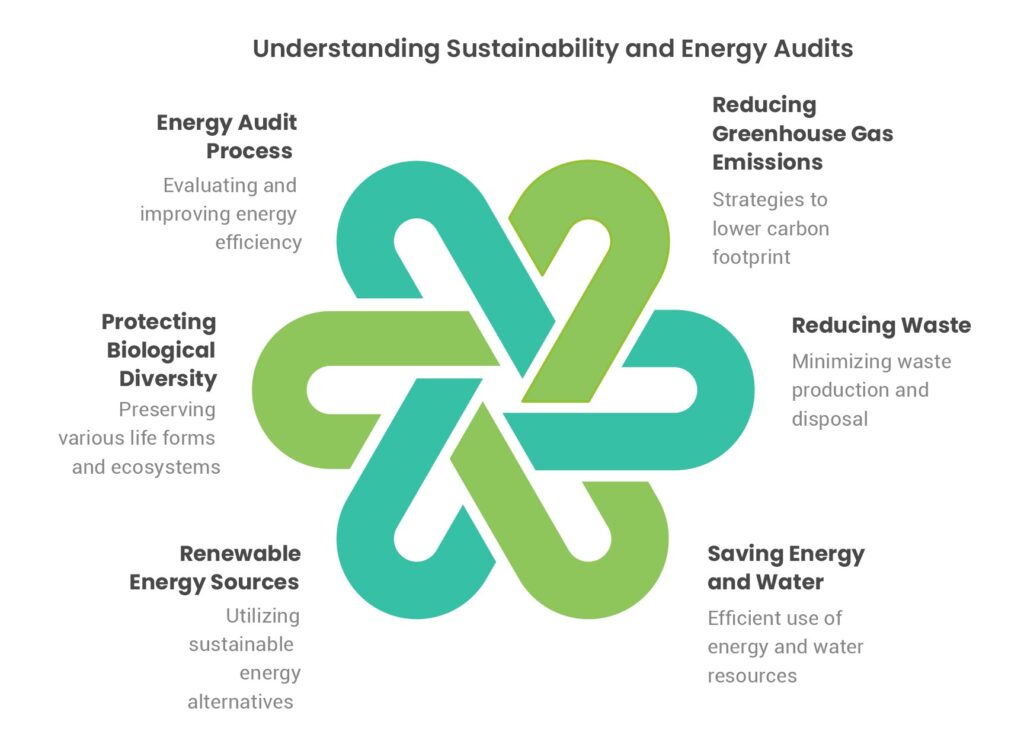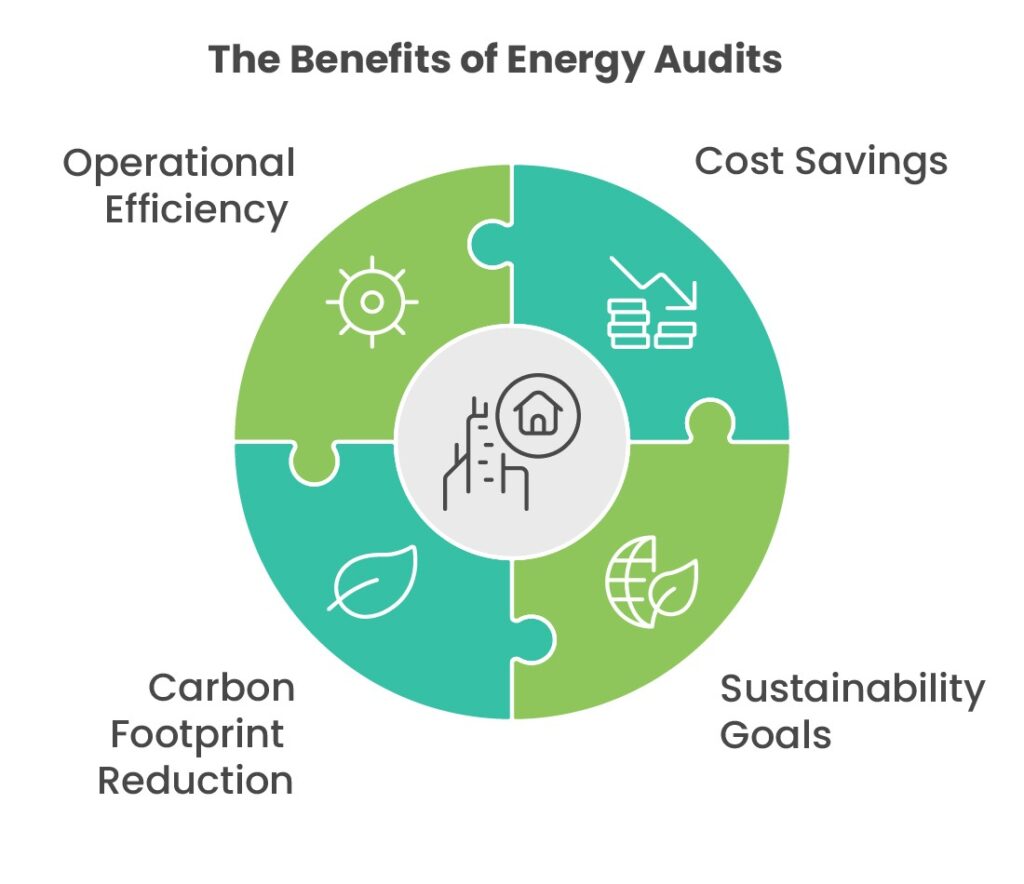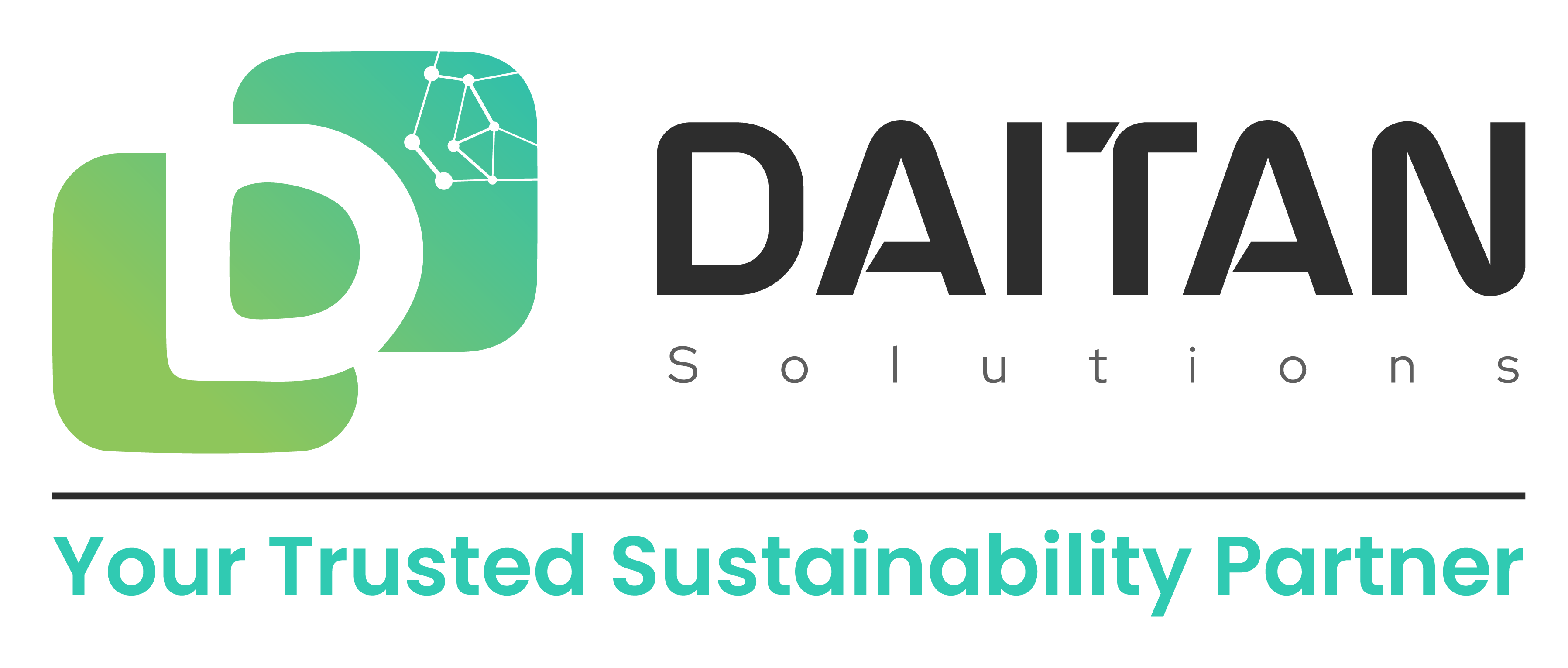Table of Contents
Why Energy Audit Is Important
If you want to understand and reduce the amount of energy used in a building or place, an energy audit is one of the most important things you should do. A complete evaluation will show places where things aren’t working as well as they could, help them get better, and lower the electricity bills.
Energy audits save you money and help you reach your sustainability goals, lower your carbon footprint, and make your business run more smoothly overall.
Whether you wish to save on dollars or help clean up the planet, an energy audit leads you along a road map of more intelligent and more sustainable energy use.
What Are Sustainability Goals And Energy Audit?
Individuals, groups, or governments can set sustainability goals, perform an energy audit, and aim to limit harmful effects on the environment and allow actions that protect ecosystems for future generations. Usually, these goals are about:
- Reducing greenhouse gas emissions.
- Reducing waste.
- Saving energy and water.
- Renewable energy sources.
- Protecting biological diversity.
An energy audit is an assessment of the energy use in a building or facility to identify opportunities to improve efficiency and cut costs.
Ordinarily, this is done through a very in-depth study of the way energy is used, heating, ventilation, and air conditioning equipment functions, lighting, insulation, and other energy-using equipment.
The audit will consist of data collection on energy use, site inspection, and historical utility billing to understand the manner and means of energy usage.
Why Supporting Sustainability Goals Matters
Protecting The Environment
Supporting sustainability goals is a way to help protect the environment by cutting down on waste and keeping natural resources safe. By using eco-friendly methods, the company will help slow down climate change, protect wildlife, and keep the earth safe for future generations.
Making Sure Regulations Are Followed
Many countries are making their environmental laws more challenging. Businesses that support environmentally-friendly ideas will follow the new rules and not get fined or punished. For example, firms in the European Union must meet the EU Green Deal goals to cut their carbon emissions by at least 55% by 2030.
Enhancing Brand Reputation
People today care more about the environment and want to combine their businesses with companies trying to be more sustainable. With a focus on sustainability, a business will get a lot of loyal customers who trust the brand.
Operational Efficiency
Using environmentally friendly methods saves money. Both cutting down on waste and conserving water would help the environment and make things run more smoothly. For example, companies can cut their energy costs significantly by using LED lights and HVAC systems that use less energy.
Detecting Leaks and Energy Loss
Energy leaks can happen in various systems, from heating and cooling to industrial machinery. Some of the most common areas where leaks and energy loss occur include:
Insulation and Building Envelope Leaks
Poor insulation and gaps in the building envelope (walls, windows, doors) can allow air to escape, making heating and cooling systems work harder. This can lead to higher energy consumption and costs.
Gaps around windows and doors are often the most significant culprits, allowing cold air to enter in winter and cool air to escape in summer.
- Example: A U.S. Department of Energy study showed that up to 30% of a building’s energy use can be lost through poor insulation and air leaks. Simple steps like sealing windows and doors and improving insulation can save energy.
HVAC Systems
Heating, ventilation, and air conditioning (HVAC) systems are notorious for energy loss if not properly maintained. Air leaks in ducts, poorly calibrated thermostats, or outdated systems can drastically reduce energy efficiency.
- Example: In commercial buildings, duct leaks can cause as much as 20-30% of the air to be lost before reaching the intended area. Sealing ducts and ensuring proper maintenance can reduce these losses and improve system performance.
Water and Steam Leaks
Leaks in water pipes and steam systems can cause significant energy loss, especially in industrial settings. Steam leaks, in particular, can result in wasted fuel as it requires considerable energy to generate steam, which is lost when leaks occur.
- Example: In manufacturing plants, undetected steam leaks can cost thousands of dollars annually. For instance, a 1/8-inch steam leak in a system operating at 150 psi can waste around $3,500 a year in energy costs. Regular inspections and maintenance can help prevent such costly losses.
Compressed Air Systems
Compressed air is often considered the “fourth utility” in industrial settings, but it’s also one of the most inefficient. Leaks in compressed air systems are common and can result in substantial energy waste, as it takes significant electricity to produce compressed air.
- Example: A small 1/4-inch leak in a compressed air system operating at 100 psi can waste over $10,000 a year in energy costs. Identifying and fixing leaks can lead to immediate savings and improve system efficiency.
Heat Loss in Boilers and Furnaces
Boilers and furnaces are commonly used for heating in industrial processes and buildings. Heat loss through inefficient systems or poorly insulated pipes can lead to wasted energy. Preventing this heat loss requires regular maintenance and ensuring systems are properly insulated.
- Example: A poorly insulated steam pipe with just 100 feet of exposed pipe could lead to an energy loss of $500 per year. Insulating pipes and upgrading to energy-efficient boilers can significantly reduce energy consumption.
Maximizing Renewable Energy Utilization
Maximizing renewable energy use ensures every watt of power produced from renewable sources is utilized effectively and efficiently. Without this, even renewable energy cannot be prevented from being wasted. Here are several reasons why maximizing renewable energy usage is of the essence:
Sustainability:
Proper utilization of renewable energy will help extend the life of these resources to be on hand for future energy needs without depleting finite natural resources.
Cost Efficiency:
Since the installation cost of renewable energy systems is very capital-intensive in the initial phase, optimal energy use can justify the investment based on future savings.
Reducing Carbon Footprint:
Even though renewable energy reduces carbon emissions dramatically compared with fossil fuels, waste, and a large carbon footprint are still inevitable with improperly managed energy resources.
Energy Security:
Maximum energy development from non-conventional sources reduces dependence on supplies from other regions and countries, thus making them more self-sufficient.

The Role of Energy Audits in Renewable Energy Utilization
An energy audit is an in-depth study of how energy is being consumed in a building, in an industrial facility, or in a process. It identifies areas of energy wastage, gives recommendations, and states actions that could be taken to improve energy efficiency.
An energy audit remains one of the most important tools for ensuring efficient utilization of renewable energy sources for users of renewable energy or those who will use renewable energy. What are the objectives of energy auditing?
Identification of Inefficiencies
Any inefficiency before installing renewable energy systems such as solar panels or wind turbines can be identified by an energy audit. In this regard, renewable energy is used most effectively by eliminating certain already present inefficiencies.
Optimizing equipment:
Easy determination using energy auditing of old equipment that might be using more energy than needed. Upgrade to more efficient systems – stretches renewable energy further.
Evaluation of the envelope:
An energy audit can determine whether a building’s insulation, windows, or doors are causing energy losses. Poor or weak insulation increases energy demand, overstraining renewable energy systems.
Reducing Waste:
Energy audits can reveal where energy is wasted through leaking air ducts or inefficient heating, ventilation, and air conditioning (HVAC) systems. Reducing this waste ensures that not one energy generated through renewable sources goes to waste.
Creating a Baseline for Renewable Energy:
What is the main benefit of an energy audit? After an energy audit corrects inefficiencies, a baseline is established. It measures the impact of renewable energy systems and ensures that they contribute optimally to energy needs.
Who Needs Energy Audit?
The short answer to who needs an energy audit is: Is anyone looking to optimize energy use, reduce costs, and maximize the benefits of renewable energy? Specifically, energy audits are beneficial for:
Commercial Buildings:
Office buildings, retail areas, and hospitality businesses use significant amounts of energy for lighting, heating, cooling, and equipment. An energy audit can, therefore, ensure that energy use is efficient and that renewable energy systems are fully optimized.
Industrial Facilities:
Factories, manufacturing plants, and other industrial operations mainly depend on energy in the operation of machines and the production process. An energy audit can indicate areas where renewable energy can be utilized to a maximum degree with minimal waste and then efficiency.
Government and Municipal Buildings:
Schools, libraries, and municipal offices pay the bills for energy using taxpayer funds. Through an energy audit of public institutions, the government can optimize its energy systems paid for by taxpayers and better use renewable energy.

Conclusion
An easy way to make things more efficient and environmentally friendly is to include an energy audit in a plan for renewable energy. It lets people and businesses find places where energy is wasted and the habits that accompany them.
Services like Daitan help businesses understand how complicated their problems are and make their energy solutions more efficient, which aligns with their larger sustainability goals. Using these lean methods will improve energy efficiency and help make the world more environmentally friendly.

